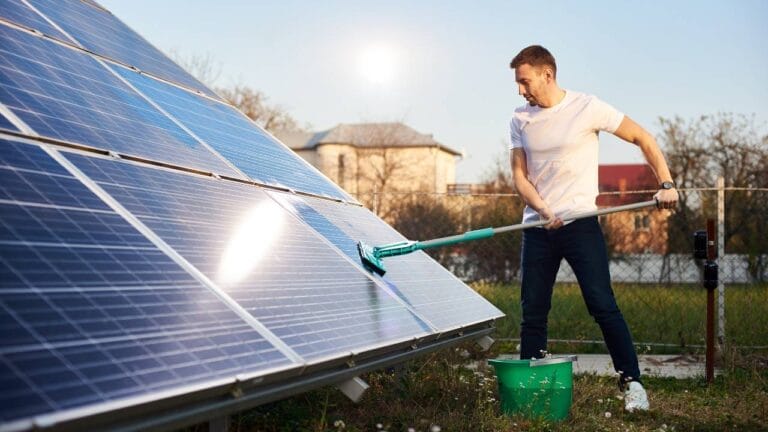Your solar panels are tilted to face the sun’s route across the sky, which means they’re pretty much self-cleaning as rain washes them down. But what if the rain doesn’t fall for months?
No rain often means more dust in the air. Add the sticky tree sap, and you end up with a messy panel surface that attracts dirt and blocks the sunlight from reaching solar cells.
As a result, your solar panels produce less electricity. Solar panels can lose up to 7% efficiency due to dust and debris.
Not in my backyard! As someone who owns and runs a 5kW solar system, I’ve found a way to keep my panels clean as long as they last.
My solar panel cleaning kit consists of a soft-bristled brush on a pole, a soft sponge, and mild dish soap. I always start by gently brushing away leaves, twigs, and loose dust.
This makes the next steps much more effective and easier to complete.
How to Clean Solar Panels in 6 Simple Steps
Step 1: Check the manufacturer’s instructions & safety
Not all solar panels are made the same, nor do they have the same maintenance suggestions. Always check manufacturer instructions before getting down to any DIY cleaning. Also, make sure you can complete the job safely.
If your solar panels are too high for you to reach even with pole attachments or set on a steep or slippery roof, please leave it to professionals.
Step 2: Remove loose debris with a soft brush
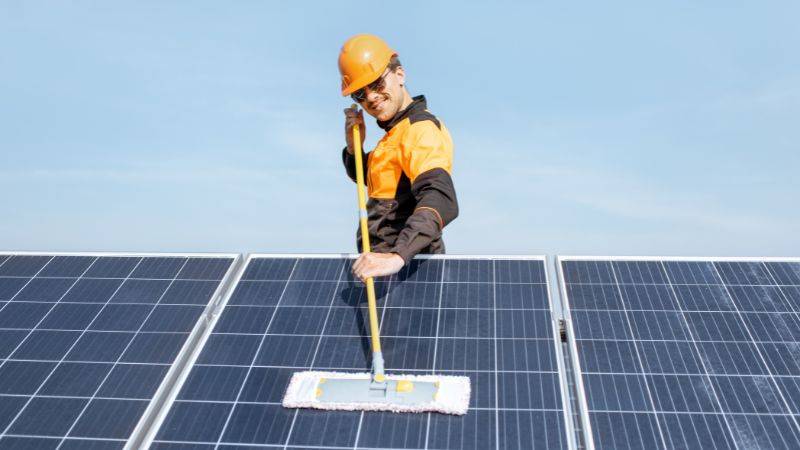
Shut your solar panels off. Solar panels are electrical equipment, and you shouldn’t do any maintenance on them while active. Use a soft-bristled brush to remove leaves, dust, and bird poop from the surface of your panels.
Use a telescopic attachment if you can’t reach the panels from the ground or your ladder. I have a flat roof with enough walking room between the rows of 100W panels, so I can do without the pole.
Step 3: Spray the panels clean with a garden hose
Here comes the most important part. Once you dislodge loose dirt, use a garden hose to wash down the rest of the muck. No need to spray them hard.
Step 4: Tend to problem areas with a soft sponge
After the hose water washes away most of the gunk, it will also reveal the stubborn areas. Get a bucket of lukewarm water and some mild dish soap. Dip your sponge and scrub away in a gentle repetitive motion.
My tip: I use a soft, perforated sponge you use for washing your car. These sponges have to be extra soft not to damage the car’s paint finish. This makes them great for solar panels.
Step 5: Rinse solar panels with the hose once more
Use the garden hose to rinse solar panels with clean water for the second time. Wash away any soap residue.
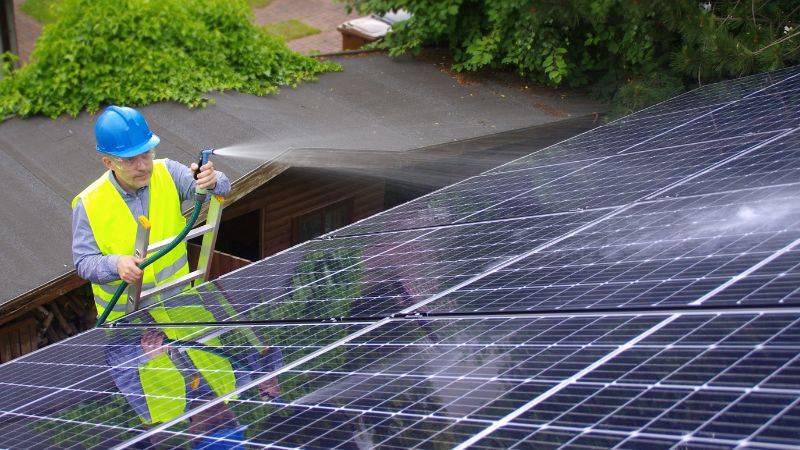
Step 6: Wipe solar panels dry
Wring the chamois dry and wipe the panels dry from top to bottom. Don’t wait too long for this step, as water will quickly evaporate, leaving white streaks you’d have to remove again.
What NOT to Do When Cleaning Solar Panels?
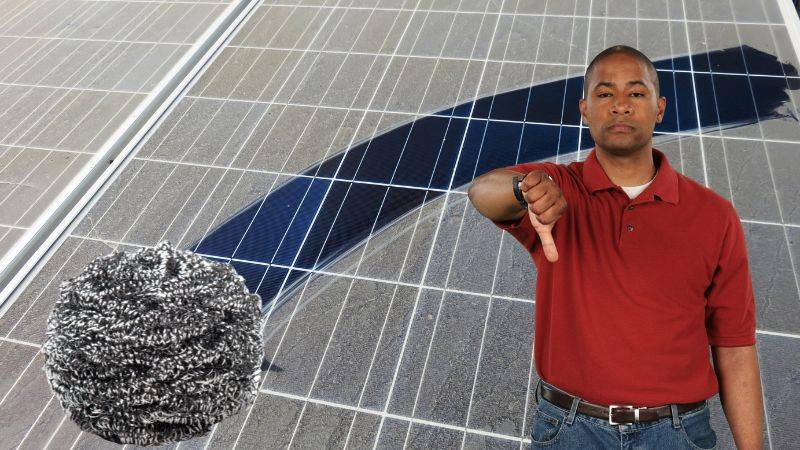
- Don’t clean your solar panels at midday — They can get very hot, and you can burn yourself. If the glass is too hot, cold water from the hose can also make them crack.
- Don’t use rough cleaning tools — Abrasive cloths, rough sponges and brushes, steel wool, as well as harsh detergents can damage the surface of your panels.
- Don’t use a pressure hose — High pressure can damage the surface of your panels and even void the warranty.
What Is the Best Thing to Clean Solar Panels With?
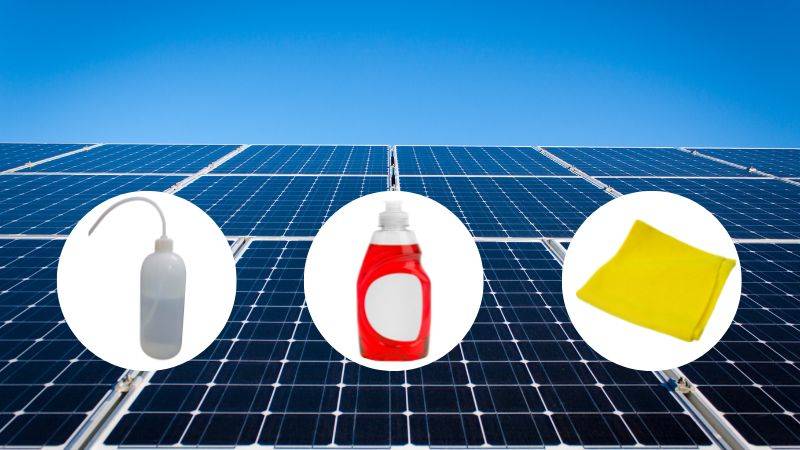
If you tried googling this answer, you probably realized that different sources tell you to use different cleaners.
The problem is that not all cleaners are safe for solar panels. The more efficient the detergent, the more likely it is to damage the glass surface of solar panels.
Water is the best solar panel cleaner, especially if it’s deionized or distilled. Demineralized water attracts other chemicals, so it’s more efficient for cleaning. However, it can be challenging to provide enough distilled water.
If the tap water is soft where you live, you’re lucky.
Unfortunately, my utility water is rather hard, so I need to use mild dish soap. I use the Frosch brand with the green frog logo because it’s earth-friendly and non-toxic for water organisms.
I found that mixing 3% soap in a bucket of lukewarm water is the best way to clean solar panels. If your water is extra hard, mix in one part vinegar with eight parts water to boost the cleaning power.
For wiping them down and removing water residue, I discovered that a chamois cloth works much better than a microfiber. It soaks in more water before it needs wringing, which allows me to wipe one panel dry in much less time.
How Often Should You Wash Solar Panels?
As a rule, you should clean your solar panels every six months, at least.
However, if your location is prone to extreme climate conditions, like dust storms, excessive rainstorms, or high winds, you should clean your panels more often.
If your home is positioned within close range of a highway or a construction site, you’ll also need to clean your solar panels more often.
Both locations produce a lot of airborne debris in the form of fine dust that literally sticks to the glass surface.
This is also important if you have solar panels on your RV. Being on the road exposes those panels to airborne buildup, both in the form of road dust and exhaust particles.
Also, homes in coastal areas are exposed to the buildup of marine salt residue, which also leaves a thin film that reduces the performance of your solar panels. The good thigh is that this buildup is easy to clean with water, and no soap is needed.
Now we should also mention portable solar panels that you take camping. Although these panels probably won’t accumulate leaves and debris like home solar panels, there’s still tree sap.
Have you ever washed a car and left it under a tree on a hot summer day? In just a couple of hours, it’s covered with sticky droplets that attract dust and bugs.
Luckily, these portable panels are waterproof, so you can easily wipe them with a moist cloth after every camping trip.
Is It Safe to Wash Solar Panels?
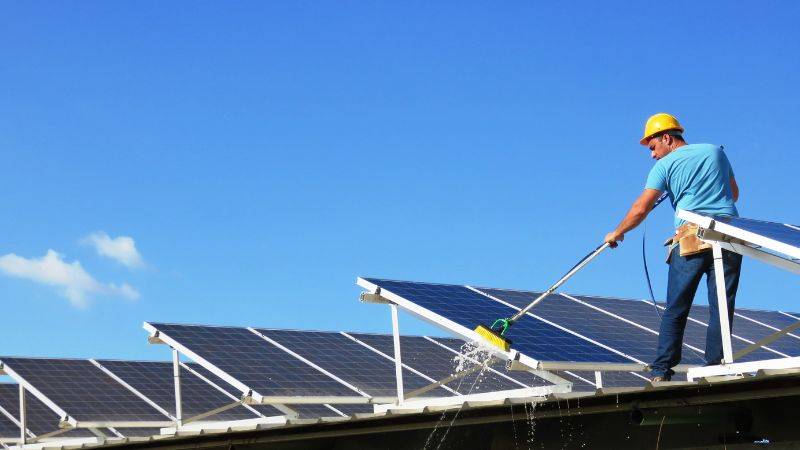
Yes, it is safe to wash solar panels if you take some basic precautions. This applies to both your safety and the safety of the solar panels.
Whether you bought or leased your solar panels, they are not cheap, and the last thing you want is to damage them by cleaning.
Your Safety Comes First
Before you climb the roof with your cleaning gear, you need to consider your safety. Keep in mind that you’re not just climbing the roof but need to do work up there, which will split your attention.
Again, your mileage may vary. If you have a flat roof with a parapet, your job is pretty easy. But if my roof sloped, I wouldn’t go up there without wearing a safety harness and a hard hat.
Heat is another challenge. On a hot summer day, solar panels can heat up to 149 °F (65 °C), so either choose a cool, overcast day for cleaning roof solar panels or do it early in the morning.
Wash Solar Panels Safely
By this, I mean you should avoid scratching solar panels at all costs. Make sure you use a soft-bristled brush to remove dirt and debris first and wash away the rest with a garden hose.
If you’re using a brush with a telescopic attachment, be careful not to hit either the side or the glass surface with the brush or the hose head.
Even though the best flexible solar panels are made with anti-scratch coating, that doesn’t cover aggressive scrubbing using the rough side of a sponge. This coating is meant to protect the panel surface from airborne dust and particles, snow, ice, etc.
Use only soft cloths and sponges, and if you need to use soap, don’t use anything stronger than dish soap.
Can You Use Vinegar and Water to Clean Solar Panels?
Yes, you can use vinegar and water to clean solar panels. If water alone won’t do it, and you’re concerned that commercial chemicals will be too harsh on the delicate glass surface of the panels, you can try using vinegar.
Vinegar is a great alternative to commercial cleaners. It’s not only naturally derived and eco-friendly, but also less abrasive than many chemical cleaners.
One of the biggest perks of using vinegar is that it contains acetic acid, which causes the strong smell that we associate with vinegar. This acid is strong enough to break most of the dirt and gunk on your solar panel but not too strong to damage the panel surface.
Still, not all types of vinegar are safe. Get white cleaning vinegar that has between 5-8% acetic acid, while cooking vinegar has a stronger concentration percentage.
However, even if you use white cleaning vinegar, it’s too strong by itself, so you need to dilute it before use.
Mix ¼ cup of vinegar with two cups of deionized water. This water has no mineral content and won’t leave any streaks when it dries, unlike tap water.
Conclusion
Cleaning solar panels is easy if you know how to do it and have the right tools at hand.
Pick a cool day for the job, or start early in the morning before the panels get too hot. Remove the loose debris using a soft-bristled brush and hose down the panels. Never apply high-water pressure.
If needed, gently scrub the stubborn areas with a soft car sponge and a solution of water, mild dishwasher soap, and white vinegar. Rinse again with a garden hose and wipe off the excess water with a chamois cloth.
I hope that now the solar panel washing process is crystal clear — just as your panels will be.
